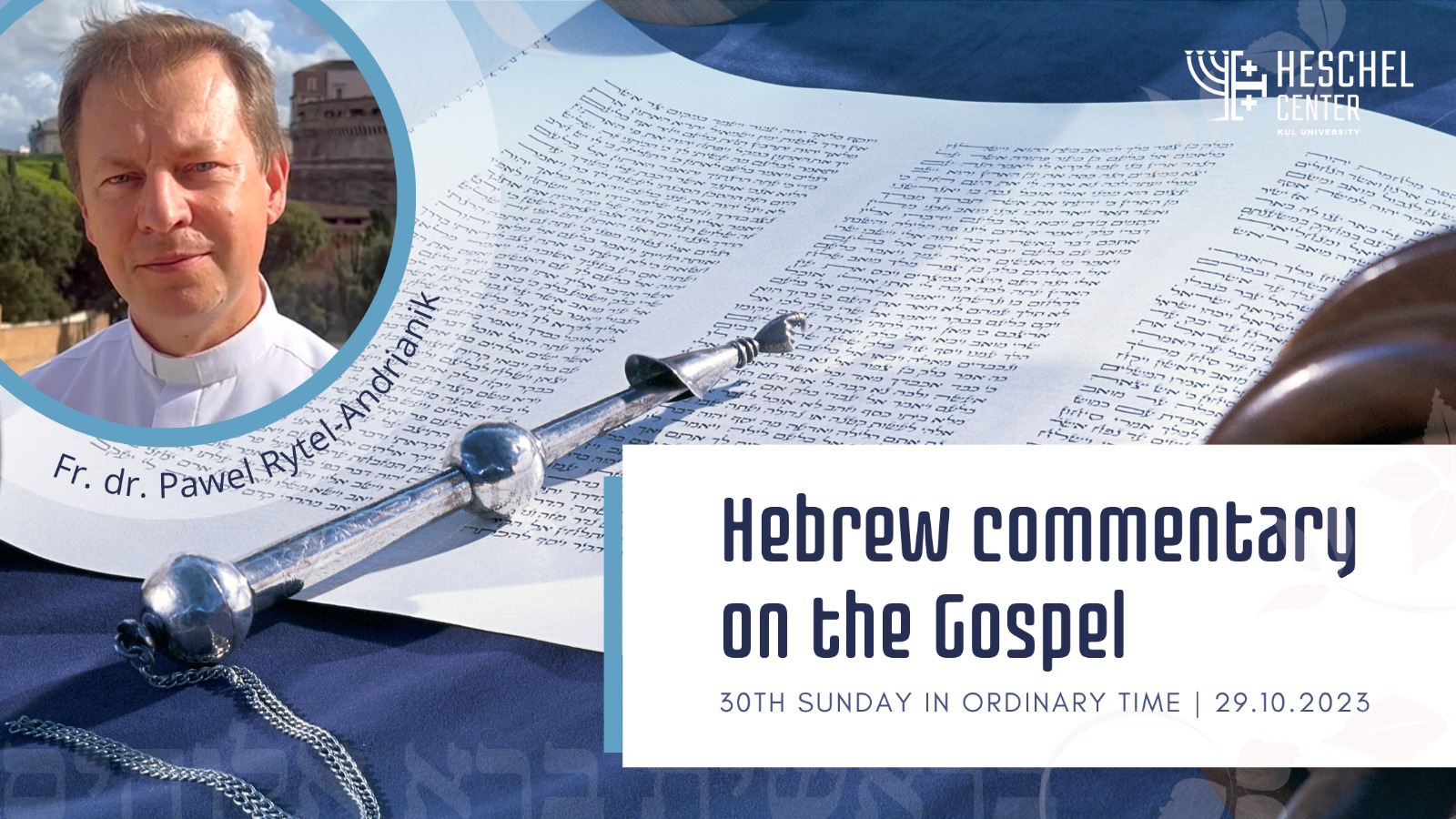Through the ears to the heart. Two commandments, four aspects of love


Photo: KUL Heschel Center
The two commandments of love in fact comprise as many as four elements: hearing, love of God, love of other people, and love of oneself. Hearing is related to God, yet our ears must be open to another person, too – says Director of the Polish Section of the Vatican media and Deputy Head of the Heschel Centre at the Catholic University of Lublin, Fr. Prof. Paweł Rytel-Andrianik in a commentary for Sunday, October 29.
As Fr. Paweł Rytel-Andrianik recalled, On Mount Sinai God gave Moses 10 commandments. Over the course of centuries, as many as 613 different commandments appeared in the Jewish tradition. “Rabbis did their best to explain and systematise these precepts, which was not easy. An average person, uneducated in the Law, could rightly feel lost in the face of such a multitude of regulations” – highlights the Bible scholar.
Today’s verses of the Gospel according to Matthew give an account of a conversation of a scholar in the Law with Jesus, who indicated the most important commandment. A similar excerpt of the gospel according to Mark precedes the commandment of love of God and the neighbour with one more commandment: “Hear, o Israel!” (Shema Israel). This is an everyday, important prayer of the Jews.
Jesus stressed the priority of the love of God and indicated a few practical signs of this love. We are to love God “with all our heart, with all our soul, with all our mind” (Mt 22:37). As Fr. Rytel-Andrianik observed, “St. Mark indicates in Jesus’ words a power and a force; in the Hebrew original meodeka or loving with all one has”. “You shall love the Lord your God with all your heart, with all your soul, with all your mind, and with all your strength” (Mk 12:30).
The love of God cannot be incomplete. “Only if our love for God is complete does love for others and ourselves assume its proper meaning” – stressed the Bible scholar, indicating that a true love of God leads towards the love of other people.
We are called to not only love God and our neighbour, but also ourselves. “Loving God and one’s neighbour in the right way enables one to love oneself in the same way. If we do not take proper care of ourselves, of our own health, heart, mind, rest, nutrition, or sleep, then we fail to observe the commandment of loving ourselves” – indicated Director of the Polish Section of Vatican Radio and Vatican News.
Deputy head of the Heschel Centre sums up: “the two commandments of love actually consist of four elements: listening, loving God, loving our neighbours, and loving ourselves”. “Listening refers to God, but our ears must also be open to the other person” – adds the Bible scholar and recalls that “When we really love someone, we not only talk to them, but also listen attentively”.
Commentary video:
The full text of the commentary can be found at the website of the Heschel Centre at the Catholic University of Lublin
The choicest feast – God’s promise shared by Christians and Jews >>>
Repentant sinners before the righteous – the Jewish sources of Jesus’ parable >>>
Limit of forgiveness or forgiveness without limit? >>>
Forgiveness which may do harm to the victim and the abuser >>>
The life of St. Peter – love that overcame fear >>>
Ties bound on earth and in heaven >>>
Jesus points to pagan woman as example of faith >>>
The calming of the storm on the lake in the eyes of the first Jewish listeners >>>
The mountain of transfiguration – a place of my being with God >>>
Sometimes you have to go on a long journey to find the treasure hidden within yourself >>>
Revelation reserved for the foolish, or the provocation of Jesus >>>
Jesus on the Jewish value of spiritual service to the righteous >>>
The New Torah and Jesus as the new Moses and the new Joshua >>>
The day is short, the work is plentiful, and the people are insolent, and the reward is great >>>
Eucharist – New Manna, God present here and now >>>
Hebrew Commenary to the Gospel: Three Names of One God >>>
The Pentateuch’s prophets and Moses predicted the outpouring of the Holy Spirit >>>
The end which is a new beginning – about an ever-present God >>>
Paraclete – three meanings of the Greek word hidden in the Old Testament >>>
The first covenant of God with the Jews is still valid >>>
Selective listening to Scripture – the mistake of the disciples at Emmaus >>>
God’s mercy inscribed on the pages of the Old Testament >>>
After his resurrection, why did Jesus first appear to women? >>>
Passover – the celebration of freedom and faith >>>
The more we know about Passover, the more we can understand the Last Supper >>>
Why did Jesus let Lazarus die? >>>
Who sinned, the blind man or his parents? >>>
How did the seventh man change the life of the Samaritan woman? >>>
Who was transfigured on Mount Tabor – the disciples or Jesus? >>>
The Desert – A Blessing or a Curse? >>>
KUL Heschel Center: Misunderstandings over the „eye for an eye” principle >>>
Law, Prophets, iota – we need to examine the context to understand the meaning of Jesus’ words >>>
Heschel Center KUL: What do salt, light and the city on a mountain mean to us? >>>
Heschel Center KUL: Why did the disciples, becoming „fishers of men,” abandon their nets? >>>
Hebrew Commentary to the Sunday Gospel excerpt – 2nd Sunday in Ordinary Time; Year A >>>
Jewish Commentary on the Gospel >>>
Hebrew commentary on the first Sunday of the New Year Gospel >>>
Jewish commentary on the Christmas Gospel >>>
Hebrew commentary on the Gospel for the Fourth Sunday of Advent >>>




Dodaj komentarz